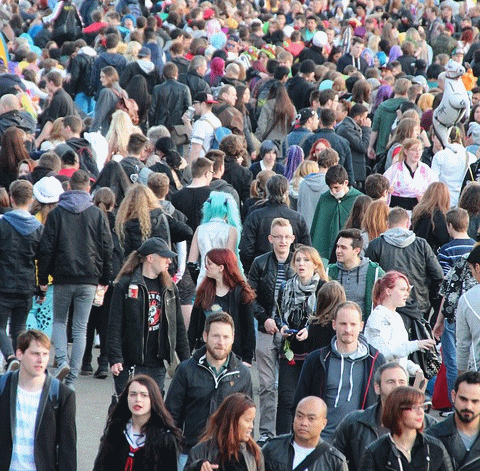DHRosier
Our society assess quantities ad nauseum on very broad scales in all respects - people, economic activity, etc.
Quality of life studies are done on an ad hoc basis and limited to very specific questions and / or limited geography. For example, many reports were written of the drought in Sudan, including all of the people who were suffering, with a focus on the children who died horribly from dehydration and starvation. That drought lasted a few years. The most terrible aspect was the fact that many of the children who died were babies conceived AFTER the drought started.
Any attempt to give you a specific answer will be ad hoc because that is the way the symptoms of overpopulation are collected, and there is no working definition of overpopulation.
There is no clear statement of what overpopulation is, nor for what reasons would a region be deemed over populated, or at what point would it be determined the region is over populated.
Those are very subjective questions - the evidence is often subtle and the symptoms evolve very slowly. We find ways to accommodate the worsening symptoms but all we accomplish is to make the degradation of life more orderly.
For example, there are water shortages in many areas of the U.S. Our response is to mandate water conservation programs. The water tables have dropped by the consumption demands of our society even when we were only 180,000,000± (circa 1960) but we are well over 300,000,000 and still growing.
We have massive immigration from countries that have much more severe overpopulation than we do, and we have vehement public reactions from both conservatives and liberals regarding the distribution and use of contraceptive practices that could help constrain the growth.
Of course, water shortages are only one of many aspects. Studies of ocean reefs suggest as many as 10% have been badly damaged or have died over the past (what, 50 years?). The point is that the pollution levels were much lower years ago than they are now. What can we expect in the future given the current levels of pollution.
Mankind is obsessed with Quantity on a global scale. Our most knowledgeable brains study economic growth ad infinitum but they never discuss how we should equate growth to progress.
For that matter, there is no definition of progress, without thinking about it most people work with the conclusion that growth IS progress, therefore progress must be growth. Worse, there is a prevailing opinion that population growth is hard wired to economic progress. If we have 3% economic growth that is good, no comment if it comes in combination with 4% population growth.
Quality of life studies are done on an ad hoc basis and limited to very specific questions and / or limited geography. For example, many reports were written of the drought in Sudan, including all of the people who were suffering, with a focus on the children who died horribly from dehydration and starvation. That drought lasted a few years. The most terrible aspect was the fact that many of the children who died were babies conceived AFTER the drought started.
Any attempt to give you a specific answer will be ad hoc because that is the way the symptoms of overpopulation are collected, and there is no working definition of overpopulation.
There is no clear statement of what overpopulation is, nor for what reasons would a region be deemed over populated, or at what point would it be determined the region is over populated.
Those are very subjective questions - the evidence is often subtle and the symptoms evolve very slowly. We find ways to accommodate the worsening symptoms but all we accomplish is to make the degradation of life more orderly.
For example, there are water shortages in many areas of the U.S. Our response is to mandate water conservation programs. The water tables have dropped by the consumption demands of our society even when we were only 180,000,000± (circa 1960) but we are well over 300,000,000 and still growing.
We have massive immigration from countries that have much more severe overpopulation than we do, and we have vehement public reactions from both conservatives and liberals regarding the distribution and use of contraceptive practices that could help constrain the growth.
Of course, water shortages are only one of many aspects. Studies of ocean reefs suggest as many as 10% have been badly damaged or have died over the past (what, 50 years?). The point is that the pollution levels were much lower years ago than they are now. What can we expect in the future given the current levels of pollution.
Mankind is obsessed with Quantity on a global scale. Our most knowledgeable brains study economic growth ad infinitum but they never discuss how we should equate growth to progress.
For that matter, there is no definition of progress, without thinking about it most people work with the conclusion that growth IS progress, therefore progress must be growth. Worse, there is a prevailing opinion that population growth is hard wired to economic progress. If we have 3% economic growth that is good, no comment if it comes in combination with 4% population growth.


